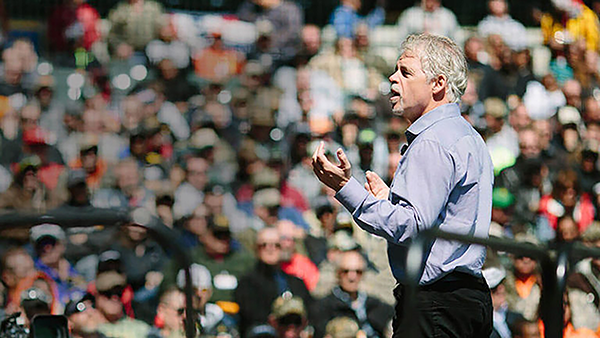
The Rewards of Not Being an Insecure Jerk
By / Mark Breslin
I did not become a CEO by being emotionally healthy and well adjusted. I did not become a public speaker and talk to 400,000 people because I was interested in them as individuals. I did not embrace the idea of empowering others with fear of failure chasing me like a junkyard dog. I did not understand that success and happiness are not the same. No matter what shows up on my title or W-2.
Leaders are made a lot of ways. And not always because we were shaped by a happy, sunshine- filled, ride-a-pony upbringing. More often than not, it is just the opposite. The fuel that drives leaders often times has its genesis in our early development. Our beliefs about ourselves are well founded way before anyone gives us a shot at career advancement. I think a lot of leaders reading this know this to be true for themselves. My story is certainly the case. My self beliefs were steeped in a youth of turbulence, instability, and trouble. I am frankly the last guy who should have made it this far.
Without really knowing it, I started my leadership with an emotional platform of fear and insecurity that I mistook for confidence. Ultimately, it got led under the need to prove myself. Over and over and over again. And that resulted in me being a very driven, aggressive, and effective leader—as well as a grade A, insecure jerk.
But through leadership trial and error (mostly error), I was able to evolve and grow. And it is this I want to share with you. The rewards of leaving that fear and ego garbage all behind. As a leader. As an influencer. As a family member. As a person.
Simply put, here it is. After all the striving, proving, and grinding you just might find that happiness and success are not the same thing. As a leader, it is not about the money, title, power, or validation. They are nice rewards, no doubt, but as a leader, it’s more about each person that we can influence in a positive way in this life. And we as leaders truly have this obligation and opportunity.
A lot of us become top leaders because we are compelled. Our fire burns red hot. Our need is to succeed and overcome. Driven by what? The raw fear of failure. The hole we are trying to fill. The respect we didn’t get. The self image we are constructing to feel real. Often we carry forward our baggage to simply prove ourselves—over and over and over without resolution. We grind and push and are willing to die on the hill to show we are worthy in the eyes of others. No way. No one else makes us worthy. No external validation makes us real or human. Service and love of self and others is the ticket. It’s not about us. It’s about the people we love and lead, care about, and influence.
After abandoning my endless idiotic quest for validation, I have tried above all, to make it about anyone else but me. But my old habits and the ego die hard. It takes a lot of work. So as a leader, I have to be less “the man” and more accepting of myself as a flawed but battle scarred human with the lessons I have paid for on deposit. I have to be careful I don’t slip backwards and simply hope to see with clarity more each day.
If you are willing to be the authentic person that you really are, you will reap rewards far beyond the validation, proving, and other stuff that substitutes for real impact. What this takes is three building blocks to self-knowledge. First, you have to do the work on yourself and solicit the painful feedback and advice that crushes your ego and builds your authentic self. Next you have to decide what’s important and act on it. Sound simple? If so, why don’t more people do it? Yeah, how many people you know are really truly emotionally healthy and secure? How many have marriages you want? How many people have a level of health and well being that make you think, “oh yeah I want that, too”? How many people get their priorities right without epic failure as their teacher? And the third and final thing: you have to understand that this life is short and valuable and that you better do something remarkable before it passes you by. Hey, just want to make a tonne of money and play golf? Good for you. Stop reading now.
I know I am annoying some of you. There’s nothing worse than a reformed smoker or anyone who gives you advice you didn’t ask for. But in writing this I am not proud of who I was and why I was that way. The advice given is simply so you don’t travel my path or pay the price like I have.
Remember, your success is not always your friend. Your amazing skills and tendencies may also be your greatest burden. Sometimes we have to risk giving up the approaches and behaviours that “made” us successful to find a different way to influence and care about others. With that comes fear of change and failure. But it all starts – for me and for every leader reading this today – with the realization that it is not about us. It is about them. And when you see it, believe it, and act on it, you will share in the greatest reward leadership has to offer: to both touch the lives of many and change you for the better. ▪
Mark Breslin is an author, speaker, CEO, and influencer inspiring change for workplace success across all levels of business. Mark has improved leadership, accountability, innovation, and engagement for organizations and individuals. He has spoken to more than 400,000 people and published hundreds of thousands of books on leadership and workplace culture. See his work at www.breslin.biz.
BECOMING A MAGNETIC AND POSITIVE LEADER
You ever get a vibe off someone when you first meet them? Right away, you either like them or you don’t. They have some kind of energy that you are responding to (good or bad) and it’s having an effect. The same thing plays out in the workplace with your crews and your routine as a leader.
Being a magnetic and positive leader is vital to success at work. Here’s why:
A magnetic and positive person draws positive people and outcomes to themselves. If you do not work at being positive, you may, without even knowing it, put out negative energy and draw negativity to yourself. Now, before you think I’m dropping some California tofu-eater metaphysical B.S. on you, give me a chance.
Being positive is very important. Being respected is, in my thinking, always better than being liked—but what if you can achieve both? What are some of the business benefits?
Positive and magnetic people:
- Are better persuaders and negotiators
- Are given the benefit of the doubt about their intentions
- Generally have more doors open to them
- Often have a network of people promoting them
- Attract others
- Make people smile
Okay, that last one is a “have a nice day” (barf) moment. But it is real. A lot of people think that being positive is simply inherent— people are either born positive or not, so they are sometimes unwilling to work at it. I disagree. Being positive is a choice.
Here’s what to keep in mind if you want to be a positive and magnetic person both in and out of the workplace:
- Be enthusiastic and show it
- Be encouraging and say it
- Be complimentary and mean it
- Show real interest in other people and their families
- Be a good and active listener
- Don’t interrupt others
- Show respect and make people feel important
And remember, as Dale Carnegie wisely said, “A person’s name is the sweetest and most important sound they can ever hear.”
Some leaders and managers revel in the idea that being a hard- ass who people fear or dislike is a good sign. Personally, I think being a positive and encouraging hard-ass is a much better idea.



